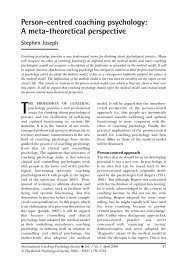Values, Virtues, and John Paul II - the St. Paul Center for Biblical ...
Values, Virtues, and John Paul II - the St. Paul Center for Biblical ...
Values, Virtues, and John Paul II - the St. Paul Center for Biblical ...
You also want an ePaper? Increase the reach of your titles
YUMPU automatically turns print PDFs into web optimized ePapers that Google loves.
of moral reasoning, Nietzsche proclaimed that goodness is not something objective thatattracts <strong>the</strong> human will, but ra<strong>the</strong>r <strong>the</strong> creative will's projection of value on somethingelse. Thus values are anchored not in objective reality, but in <strong>the</strong> subjective will. AsNietzsche understood it, Bloom continues, "men in our current decrepitude could take iteasy if <strong>the</strong>y believed God, nature, or history provides values."As <strong>the</strong> disastrous consequences of our pervasive ethical relativism become more <strong>and</strong>more apparent, <strong>the</strong>re is evidence of a growing frustration with values whose only claim tovalidity is personal preference <strong>and</strong> taste. Yet <strong>the</strong> road to recovery is still uncertain. In <strong>the</strong>face of <strong>the</strong> present crisis it seems <strong>the</strong>re are two possible paths to take in our approach tovalues: ei<strong>the</strong>r to ab<strong>and</strong>on discourse on values in favor of more traditional ethicallanguage, or to assert <strong>the</strong> objective foundation of values <strong>and</strong> hence a system by which<strong>the</strong>y can be compared, evaluated, <strong>and</strong> judged.The consensus seems to favor <strong>the</strong> abolition of "values." Never<strong>the</strong>less, a convincingargument can also be made <strong>for</strong> <strong>the</strong> second option. While discussion on virtues indeedmust be vigorously reintroduced into <strong>the</strong> public <strong>for</strong>um, it doesn't necessarily follow thatvirtues must be promoted to <strong>the</strong> exclusion of values-as we can see if we examine <strong>the</strong>approach that Pope <strong>John</strong> <strong>Paul</strong> <strong>II</strong> has taken towards values.Allan Bloom is thoroughgoing in his analysis of Nietzsche's philosophy of values, but <strong>the</strong>practical conclusion he draws is fatally flawed. The proposal to jettison "values" fromphilosophical <strong>and</strong> ethical lexicon reflects an erroneous underst<strong>and</strong>ing of <strong>the</strong> nature <strong>and</strong>role of words. All words run <strong>the</strong> risk of being manipulated, but <strong>the</strong>y can also beredeemed. In culture wars, as in philosophical debate, words are often like towns along<strong>the</strong> battle front: <strong>the</strong>y offer a strategic position <strong>and</strong> must be fought <strong>for</strong> <strong>and</strong> defended, <strong>and</strong>not relinquished as soon as <strong>the</strong> enemy advances. Along with "values," Bloom stigmatizessuch words as "au<strong>the</strong>nticity," "commitment," <strong>and</strong> "decision," all of which havethoroughly legitimate <strong>and</strong> worthwhile uses. These terms need to be rehabilitated <strong>and</strong>purified, not discarded-else every word claimed by a philosophical or psychologicalschool would have to be declared unsuitable <strong>for</strong> meaningful discourse. By this logic wecould no longer speak of freedom after Sartre, of tolerance after Voltaire, or of socialjustice after liberation <strong>the</strong>ology.Though Bloom brought to <strong>the</strong> <strong>for</strong>e suspicions about "values" terminology, doubts hadbeen raised decades be<strong>for</strong>e <strong>the</strong> appearance of The Closing of <strong>the</strong> American Mind. In 1953<strong>the</strong> philosopher Leo <strong>St</strong>rauss published Natural Right <strong>and</strong> History, in which he ablydemonstrates <strong>the</strong> incoherence of Max Weber's fact-value distinction. Ten years later<strong>St</strong>rauss lamented <strong>the</strong> relativism ushered in by <strong>the</strong> social sciences <strong>and</strong> <strong>the</strong>ir methods in apaper on <strong>the</strong> behavioral sciences. This "new political or social science," says <strong>St</strong>rauss,rests on "sociological or psychological <strong>the</strong>ories" that exclude an objective base. "Byteaching <strong>the</strong> equality of all values, by denying that <strong>the</strong>re are things which are intrinsicallyhigh <strong>and</strong> o<strong>the</strong>rs which are intrinsically low as well as by denying that <strong>the</strong>re is an essentialdifference between men <strong>and</strong> brutes, it unwittingly contributes to <strong>the</strong> victory of <strong>the</strong> gutter."



